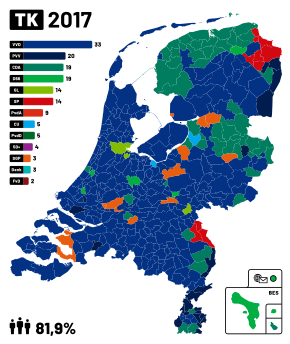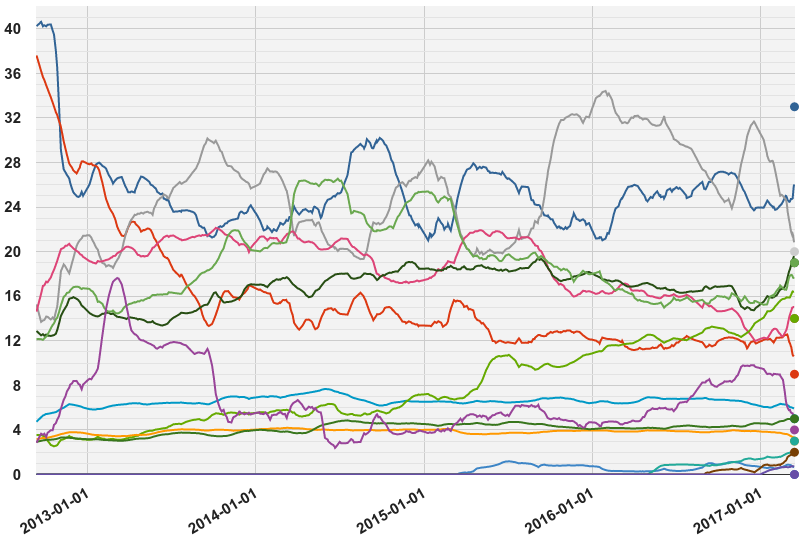2017 Dutch general election
This article documents a current election. Information may change rapidly as the election progresses until official results have been published. Initial news reports may be unreliable, and the last updates to this article may not reflect the most current information. (March 2017) |
| ||||||||||||||||||||||||||||||||||||||||||||||||||||||||||||||||||||||||||||||
All 150 seats to the House of Representatives 76 seats needed for a majority | ||||||||||||||||||||||||||||||||||||||||||||||||||||||||||||||||||||||||||||||
This lists parties that won seats. See the complete results below.
| ||||||||||||||||||||||||||||||||||||||||||||||||||||||||||||||||||||||||||||||
General elections were held in the Netherlands on Wednesday 15 March 2017 to elect all 150 members of the House of Representatives.[1]
For a considerable time (2002–2012), every cabinet had resigned before completing its full four-year term, although the cabinet formed after the 2012 elections did complete a four-year term. The 2012 elections saw the Labour Party (PvdA) and People's Party for Freedom and Democracy (VVD) go head-to-head for the position of prime minister, gathering enough seats in the process to form an absolute majority. Incumbent Prime Minister Mark Rutte (VVD) formed a coalition government with the PvdA, ousting the Christian Democratic Appeal (CDA) from government, while the Party for Freedom (PVV) went back to full opposition. Because the second Rutte cabinet lacked a majority in the Senate, it has relied on the support of the Democrats 66 (D66), ChristianUnion (CU) and Reformed Political Party (SGP).
Electoral system and organisation

The House of Representatives, or Second Chamber (Tweede Kamer) is composed of 150 seats elected by proportional representation in a single nationwide constituency, with a legal threshold of 0.67% and residuals assigned by the D'Hondt method.[2]
Following reports from the General Intelligence and Security Service (AIVD) that Russian hacking groups Fancy Bear and Cozy Bear had made several attempts to hack into Dutch ministries, including the Ministry of General Affairs to gain access to secret government documents,[3] Dutch Minister of the Interior and Kingdom Relations Ronald Plasterk announced that votes for the election would be processed by hand,[4] although that decision was later reversed.[5] Preliminary results based on a "quick count" will be available on 15 March, but the official result will not be announced until 16:00 CET on 21 March.[6] The polling firm Ipsos released an exit poll as soon as polls closed.[7] This poll indicated that the VVD won 31 seats, the CDA, D66, and PVV each won 19 seats, GroenLinks won 16, SP won 14, PvdA won 9, CU won 6, PvdD won 5, 50PLUS won 4, DENK and SGP each won 3, and FvD won 2.[8] The exit poll also indicated a turnout of 82%, which would be the highest since 1981 if confirmed.[9]
The elections are also to be seen as a barometer of interest in the Dutch political system by voters in the Caribbean Netherlands, which first voted in 2012, with a low turnout figure.[10]
Participating parties
Campaign
Debates
Opinion polls
The seat projections in the graphs below are continuous from September 2012 (the last general election) up to the current date. Each colored line specifies a political party; numbers on the vertical axis represent numbers of seats. These seat estimates are derived from estimates by Peilingwijzer ("polling indicator") by Tom Louwerse, a professor of political science at Leiden University; they are not strictly polling averages, but the results of a model calculating a "trajectory" for each party based on changes in support over time in between polls conducted by I&O Research, Ipsos, TNS NIPO, LISS panel, Peil, and De Stemming, and adjusting for the house effects of each individual pollster.[17]
Results
Template:Dutch general election, 2017
Government formation
At least four parties will be required to form a coalition with a majority. Media sources reported that Mark Rutte would seek to form a government with the support of D66 and CDA, with at least one further coalition member required.[18]
All main parties have stated that they will not enter a coalition with the PVV.
See also
References
- ^ "Verkiezingskalender". Kiesraad. Retrieved 13 September 2016.
- ^ "Act of 28 September 1989 containing new provisions governing the franchise and elections (Elections Act)" (PDF). Government of the Netherlands. 29 October 2009. Retrieved 16 March 2017.
- ^ Modderkolk, Huib (February 4, 2017). "Russen faalden bij hackpogingen ambtenaren op Nederlandse ministeries". De Volkskrant (in Dutch).
- ^ Cluskey, Peter (February 3, 2017). "Dutch opt for manual count after reports of Russian hacking". The Irish Times.
- ^ Huib Modderkolk (3 March 2017). "Plasterk draait: tóch stemsoftware bij verkiezingen". de Volkskrant.
- ^ "Hoe wordt de uitslag bij de Tweede Kamerverkiezing 2017 vastgesteld?". Kiesraad. 9 March 2017. Retrieved 14 March 2017.
- ^ "TK2017 - de exitpoll". Ipsos Nederland. 15 March 2017. Retrieved 15 March 2017.
- ^ "NOS Uitslagen verkiezingen 2017". NOS. 15 March 2017. Retrieved 15 March 2017.
- ^ "Eerste exitpoll: VVD grootste partij". NRC Handelsblad. 15 March 2017. Retrieved 15 March 2017.
- ^ http://www.telegraaf.nl/binnenland/27808290/__Verkiezingen_graadmeter_BES__.html
- ^ 28 partijen nemen deel aan Tweede Kamerverkiezingen 2017, kiesraad.nl, 3 februari 2017
- ^ "Persberichten van Lokaal in de Kamer - eigen berichtgeving".
- ^ "Rode Hoed Debat scoort ondanks Boer Zoekt Vrouw". Mediacourant.nl (in Dutch).
- ^ "Carré-debat" (in Dutch).
- ^ "Confrontatie Rutte en Wilders in EenVandaag-debat". EenVandaag (in Dutch).
- ^ "Loting NOS-verkiezingsdebatten verricht". NOS (in Dutch).
- ^ "Peilingwijzer" (in Dutch).
- ^ "Dutch election: Wilders defeat celebrated by PM Rutte". BBC News. 16 March 2017. Retrieved 16 March 2017.




